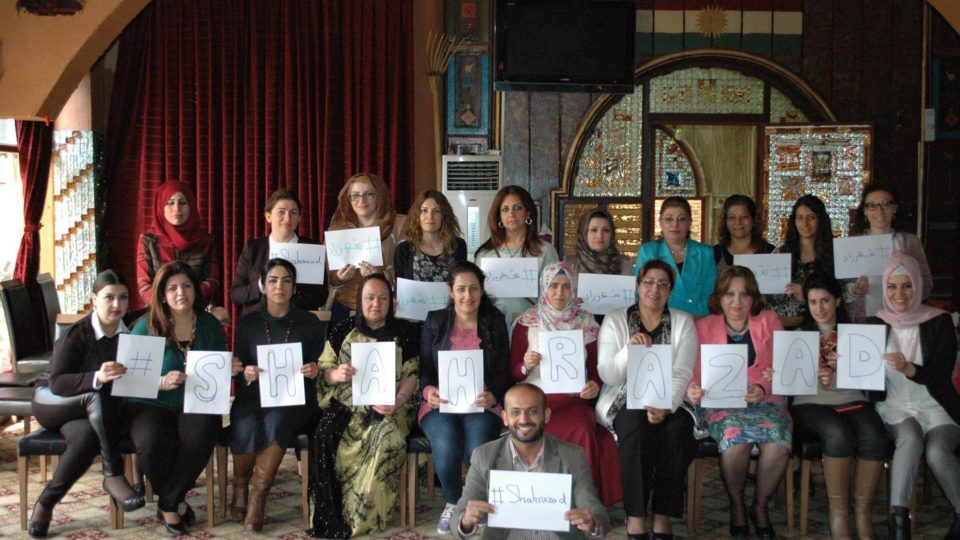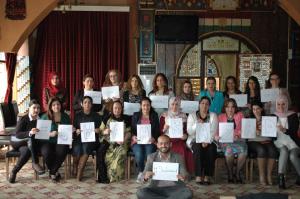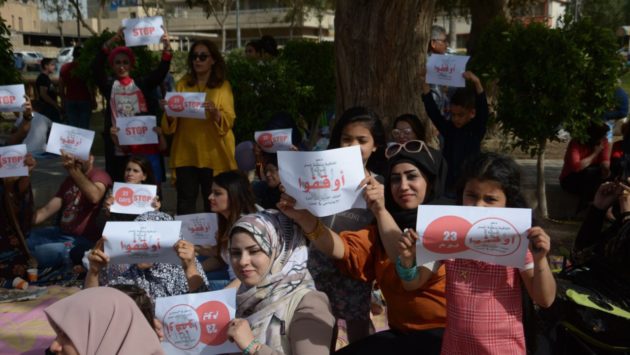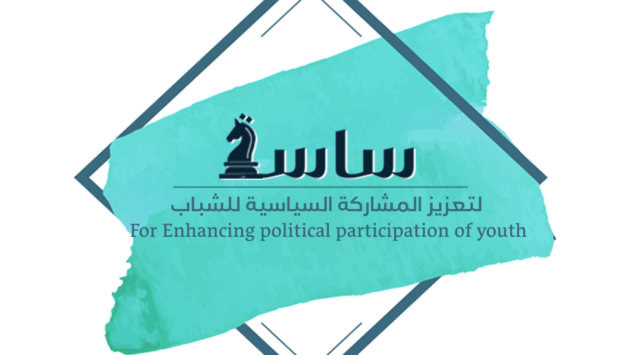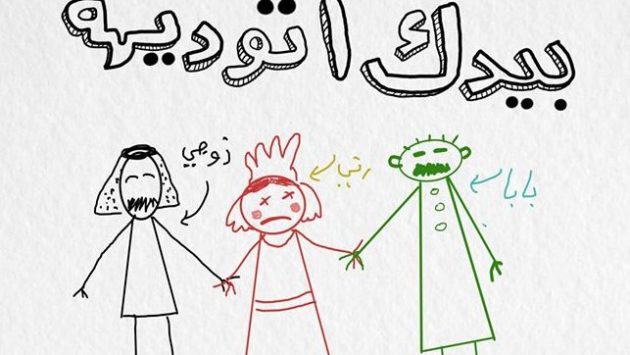Shahrazad: mobilizing civil society and public opinion against underage marriage and sexual harassment in Iraq
Emtinan Hikmat_ Almasala Organization
Report on workshop, Erbil, 8-10/ March/ 2015
Based on the firm conviction that another Iraq is possible — that is, a peaceful and unified country where women’s rights are acknowledged and respected — the Shahrazad campaign has initiated several activities in collaboration with Almasala (an organization for human resource development) and with the cooperation of the Iraqi Civil Society Initiative (ICSSI). Recently, they set up a workshop in Erbil to prepare women/youth to take active part in Shahrazad activities.
The workshop started 7 March at 9 AM in Chwar Chra Hotel in Erbil, and had 25 participants. In addition to these individual attendees, there was also collaboration with the international volunteer organization based in Pisa, Un Ponte Per, as well as a number of media agencies in Erbil.
The workshop started with a representative from the Almasala organization who gave a brief introduction to and overview of the Shahrazad campaign, which started its work in April 2014. The campaign was launched to stand firmly against what is called AL_Jaafari Law, which allows for underage marriage (for girls as young as nine years old), sanctions marital rape, and grants clerics wide power to violate the Iraqi civil law in the attempt to impose “Islamic law” on the Iraqi society. The campaign also addresses the lack of effort made to confront and resolve the enormous problem of sexual harassment in Iraq today, due largely to a tendency to avoid discussing this sensitive subject on the pretext that tradition does not allow society to discuss it.
Next, activities were prepared for the Shahrazad campaign, such as field research, advocacy and awareness-raising activities. link
Defining Sexual harassment, and understanding its legal framework:
Wahbea Zarar was a presenter and session leader, the first session started by defining sexual harassment and underage marriage. She divided the participants into two groups. All agreed that sexual harassment is a kind of unacceptable action, whether it be a look, a touch, something verbal, and in the worst cases, rape. Participants and Zarar discussed some particular examples and then watched several short movies on the topic.
Then some legislation relating to sexual harassment was presented and discussed, and participants concluded that these laws do not provide sufficient protection to the victims of harassment. For example, the victim of harassment must provide evidence to prove that the harassment in fact occurred, which is very difficult due to the sensitivity of the subject. Also, the penalty for those convicted of sexual harassment is generally imprisonment or a fine. Overall, the participants found the legal framework to be far too weak and in need of modification if it was to ensure the protection and the rights of the victims of harassment.
From the social perspective, participants noted that it is often the victim of sexual harassment who is blamed, told that it is her fault because she wears this outfit, or because she was out on the road at this time, or in this specific place. Thus the victims often do not charge the harasser and instead prefer not to take any action.
In cases of harassment within schools, universities or the workplace, the victim of harassment is sometimes prevented from continuing work or study. Often the brother, father, or husband of the victim will force her to stay in the house in the event of harassment, thus drastically constraining her freedom (and sometimes the abuse continues at home).
Underage marriage: often cases are not recorded
The marriage of minors under 18 years is not recorded in the civil registry because it is forbidden by law, however, there are cases of marriage out of court and without civil registration. There is no law for punishing the people responsible for organizing such marriages, such as: the parents or religious elders (of the religion of the husband). Although the law has not been enacted — al Jaafari is effectivelY frozen — still the practice of child marriage continues and thus presents an ongoing issue which needs to be faced by Iraqi civil society. The Iraqi Media Women Forum, in this workshop, showed the role of the Forum in raising awareness about child marriage and its efforts to make people understand the grave risks the Jaafari law still presents. Participants watched the film, Alsarkha, which dramatically presents the case against underage marriage.
The roll of traditional media and social media in the Shahrazad campaign
A number of women from the media and local satellite channels attended the workshop, and put out many reports and interviews about the campaign and its goals and projects.
The workshop also dealt with the role of community media in reinforcing the campaign. Aus Yassin, from the Iraqi Media Network community, spoke during the workshop sessions, and showed how to use social media more effectively, especially Shahrazad’s webpage. He also provided some ideas for the good use of Twitter.
This workshop also made good use of modern communication technologies: during the workshop there was a link with the Baghdad camp “youth with Scheherazade” (link). The video connection add possible the exchange of news and information between the camp and workshop.
The workshop included some conversations via Skype, which established solidarity with the Iraqi Civil Society Initiative (ICSSI), Walk Free, and UPP (Un Ponte Per). There were debates and discussions about upcoming activities for the campaign, and how to cope with the current challenges. The workshop also received messages from the international community expressing solidarity with the Shahrazad campaign.
Future plans for the Shahrazad campaign
The participants discussed and planned activities for the campaign moving forward: partners will organize two research papers on the subject of sexual harassment, one of them in the province of Kurdistan, and the other in Baghdad. Research will be followed by advocacy, and forums to discuss the findings and recommendations that grew out of the workshop. It was also agreed to produce media awareness materials, such as posters and videos which could then be shared publicly during the campaign’s future activities, as well as presented through social media.
Photos of the event are available in our Facebook page

